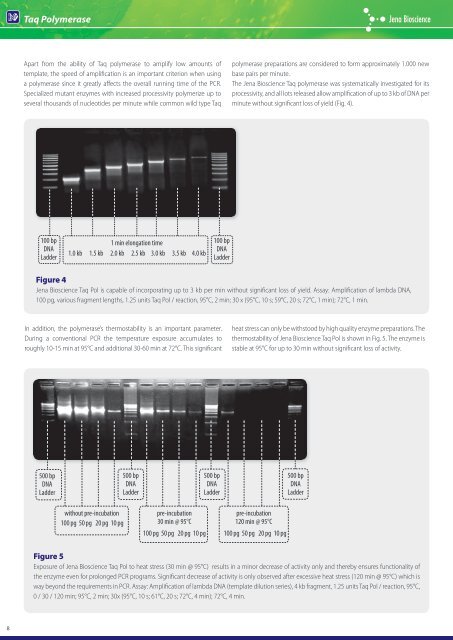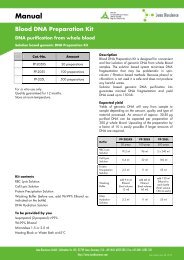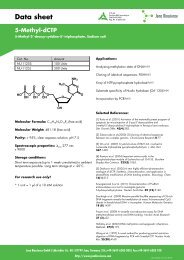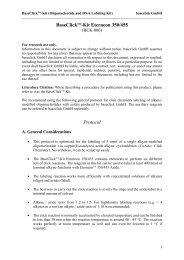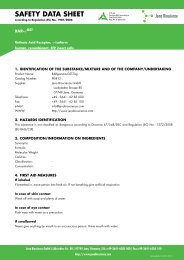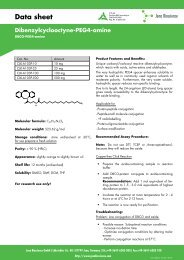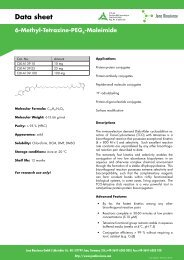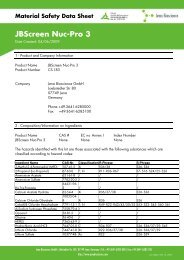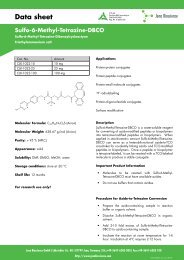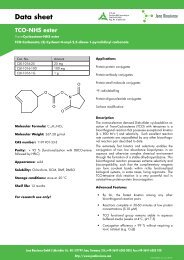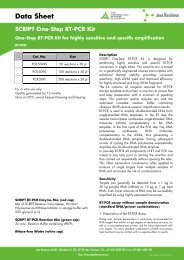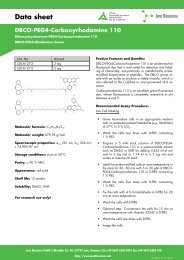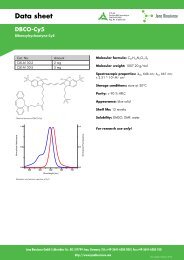Polymerase Guide - Jena Bioscience
Polymerase Guide - Jena Bioscience
Polymerase Guide - Jena Bioscience
You also want an ePaper? Increase the reach of your titles
YUMPU automatically turns print PDFs into web optimized ePapers that Google loves.
8<br />
Taq <strong>Polymerase</strong><br />
Apart from the ability of Taq polymerase to amplify low amounts of<br />
template, the speed of amplification is an important criterion when using<br />
a polymerase since it greatly affects the overall running time of the PCR.<br />
Specialized mutant enzymes with increased processivity polymerize up to<br />
several thousands of nucleotides per minute while common wild type Taq<br />
100 bp<br />
DNA<br />
Ladder<br />
1 min elongation time<br />
1.0 kb 1.5 kb 2.0 kb 2.5 kb 3.0 kb 3.5 kb 4.0 kb<br />
100 bp<br />
DNA<br />
Ladder<br />
polymerase preparations are considered to form approximately 1.000 new<br />
base pairs per minute.<br />
The <strong>Jena</strong> <strong>Bioscience</strong> Taq polymerase was systematically investigated for its<br />
processivity, and all lots released allow amplification of up to 3 kb of DNA per<br />
minute without significant loss of yield (Fig. 4).<br />
Figure 4<br />
<strong>Jena</strong> <strong>Bioscience</strong> Taq Pol is capable of incorporating up to 3 kb per min without significant loss of yield. Assay: Amplification of lambda DNA,<br />
100 pg, various fragment lengths, 1.25 units Taq Pol / reaction, 95°C, 2 min; 30 x (95°C, 10 s; 59°C, 20 s; 72°C, 1 min); 72°C, 1 min.<br />
In addition, the polymerase’s thermostability is an important parameter.<br />
During a conventional PCR the temperature exposure accumulates to<br />
roughly 10-15 min at 95°C and additional 30-60 min at 72°C. This significant<br />
500 bp<br />
DNA<br />
Ladder<br />
500 bp<br />
DNA<br />
Ladder<br />
500 bp<br />
DNA<br />
Ladder<br />
without pre-incubation pre-incubation<br />
pre-incubation<br />
100 pg 50 pg 20 pg 10 pg<br />
30 min @ 95°C<br />
120 min @ 95°C<br />
100 pg 50 pg 20 pg 10 pg 100 pg 50 pg 20 pg 10 pg<br />
heat stress can only be withstood by high quality enzyme preparations. The<br />
thermostability of <strong>Jena</strong> <strong>Bioscience</strong> Taq Pol is shown in Fig. 5. The enzyme is<br />
stable at 95°C for up to 30 min without significant loss of activity.<br />
Figure 5<br />
Exposure of <strong>Jena</strong> <strong>Bioscience</strong> Taq Pol to heat stress (30 min @ 95°C) results in a minor decrease of activity only and thereby ensures functionality of<br />
the enzyme even for prolonged PCR programs. Significant decrease of activity is only observed after excessive heat stress (120 min @ 95°C) which is<br />
way beyond the requirements in PCR. Assay: Amplification of lambda DNA (template dilution series), 4 kb fragment, 1.25 units Taq Pol / reaction, 95°C,<br />
0 / 30 / 120 min; 95°C, 2 min; 30x (95°C, 10 s; 61°C, 20 s; 72°C, 4 min); 72°C, 4 min.<br />
500 bp<br />
DNA<br />
Ladder


